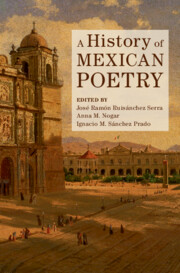Book contents
- A History of Mexican Poetry
- A History of Mexican Poetry
- Copyright page
- Contents
- Figures
- Contributors
- Introduction
- Chapter 1 The Practice of Epic and Lyric Writing in Colonial Mexico
- Chapter 2 La lírica del Fénix: Sor Juana’s Poetic Legacy
- Chapter 3 The Sound of the Word: Music and Social Transgression in Lyric Poetry from the Colonia Onward
- Chapter 4 We, the Romantics
- Chapter 5 Sentimental Sociabilities: The Young Romantics and Their Long-Lived Widows
- Chapter 6 Modernismo’s Strategic Occidentalism: Notes on Manuel Gutiérrez Nájera, Amado Nervo, and José Juan Tablada
- Chapter 7 The Crepusculars: Criollo Modernism and the Invention of the Literary Province
- Chapter 8 Poesía en voz alta: A Trajectory of Poetry and Performance in México
- Chapter 9 The Great Synthesis of the Critical Poets: The Rise of Octavio Paz
- Chapter 10 Octavio Paz and the Institutions of Poetry
- Chapter 11 The Form That Contains Multitudes: The Mexican Long Poem (1924–2020)
- Chapter 12 Radical Freedoms: Neobaroque, Postpoetry
- Chapter 13 The Age of Anthology
- Chapter 14 Twentieth-Century Mexican Poetry: The Popular and the Political
- Chapter 15 Poetry in Indigenous Languages: From the Sixteenth to the Twenty-First Centuries
- Chapter 16 Chicanx Poetry: The Living Lyric
- Chapter 17 Racimos: Dissonances in Mexican Poetry of Today
- Index
- References
Chapter 12 - Radical Freedoms: Neobaroque, Postpoetry
Published online by Cambridge University Press: 21 March 2024
- A History of Mexican Poetry
- A History of Mexican Poetry
- Copyright page
- Contents
- Figures
- Contributors
- Introduction
- Chapter 1 The Practice of Epic and Lyric Writing in Colonial Mexico
- Chapter 2 La lírica del Fénix: Sor Juana’s Poetic Legacy
- Chapter 3 The Sound of the Word: Music and Social Transgression in Lyric Poetry from the Colonia Onward
- Chapter 4 We, the Romantics
- Chapter 5 Sentimental Sociabilities: The Young Romantics and Their Long-Lived Widows
- Chapter 6 Modernismo’s Strategic Occidentalism: Notes on Manuel Gutiérrez Nájera, Amado Nervo, and José Juan Tablada
- Chapter 7 The Crepusculars: Criollo Modernism and the Invention of the Literary Province
- Chapter 8 Poesía en voz alta: A Trajectory of Poetry and Performance in México
- Chapter 9 The Great Synthesis of the Critical Poets: The Rise of Octavio Paz
- Chapter 10 Octavio Paz and the Institutions of Poetry
- Chapter 11 The Form That Contains Multitudes: The Mexican Long Poem (1924–2020)
- Chapter 12 Radical Freedoms: Neobaroque, Postpoetry
- Chapter 13 The Age of Anthology
- Chapter 14 Twentieth-Century Mexican Poetry: The Popular and the Political
- Chapter 15 Poetry in Indigenous Languages: From the Sixteenth to the Twenty-First Centuries
- Chapter 16 Chicanx Poetry: The Living Lyric
- Chapter 17 Racimos: Dissonances in Mexican Poetry of Today
- Index
- References
Summary
In the same way as the popular returns to poetic discourses, as studied in Chapter 14, so does the Baroque – an aesthetic which, as Bolívar Echeverría has taught us, is not a passing phase, but rather one of modernity’s faces. In this chapter, a panoply of authors – some of them included in the seminal Medusario anthology, some of them readers of it – are considered in the light of the Neobaroque and postpoetry. The authors discussed include Gerardo Deniz, David Huerta, Coral Bracho, Myriam Moscona, Luis Felipe Fabre, Ricardo Cázares, and Alejandro Tarrab.
Keywords
- Type
- Chapter
- Information
- A History of Mexican Poetry , pp. 220 - 241Publisher: Cambridge University PressPrint publication year: 2024



